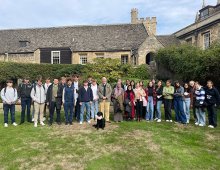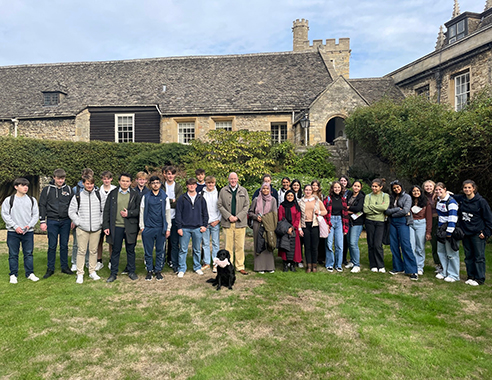
On Monday, the Sixth Form IB cohort visited the Pitt Rivers Museum and New College, Oxford, with the IB cohort at Bedford School for a trip relating to our Theory of Knowledge (ToK) curriculum.
Theory of Knowledge is a unique subject within the International Baccalaureate (IB), which allows students to reflect not only on what we know, but how we know.
Aveleen Jandu (Lower Sixth) reflected on the engaging trip: “The Pitt Rivers Museum holds a huge range of colonial artefacts which are on display according to their country of origin and historical context. We had the opportunity to explore these artefacts with a critical lens, identifying the ways they were obtained and the importance of these to the acquisition and development of cultural knowledge.
“I particularly found interest in the display of First Nation headdresses ‘War Bonnets’ and their cultural significance. We also explored the use of cultural appropriation in modern day society and the influence this has had on the narrative belonging to indigenous societies around the world.
“The experience of visiting the Pitt Rivers museum provided a wealth of ideas linked to the ToK course and was also a great opportunity to engage with students from Bedford School.”
Mrs Everitt (ToK Coordinator) added: “At New College, we were privileged to have a guided tour from the Warden, Miles Young, an Old Bedfordian. He talked about how the college had changed, and how it had been constructed according to changing aesthetic ideas about architecture, as well as changing needs in the student community. The college chapel is large and prominent, reflecting the centrality of Christianity to the foundation; the college was set up to educate men in studies of Divinity particularly, and the chapel was used daily: the whole community would gather together for prayer and worship. Yet projects now include the building of new student accommodation, to provide not only for the increasing university population, but also so that fewer students have to live outside of the college; it reflects a different but also important ideal of community.
“Walking through Oxford, it is fascinating to see how, architecturally, the city reflects changing ideals and values - from the evident ideal of what might be termed 'bookish' academic study demonstrated by the grandeur and size of the Bodleian Library and Radcliffe Camera, through to the wider interests in science and culture shown in the newer Museum of Natural History (sometimes dubbed a 'cathedral' to science) and the Pitt Rivers Museum itself.”





















